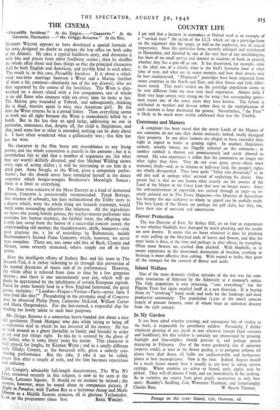THE CINEMA-, " Piccadilly Incident." At the Empire.—" Concerto." At the
Gaumont, Haymarket—" Mr. Griggs Returns." At the Ritz.
HERBERT WILCOX appears to have developed a special formula of his own, designed no doubt to capture the box office on both sides of the Atlantic. He takes a typical feuilleton story, and decorates it with bits and pieces from other feuilleton stories ; then he shuffles the whole affair about and fixes things so that the principal characters shall be both English and American, and terribly kind to each other. The result is, in this case, Piccadilly Incident. It is about a whirl- wind war-time marriage between a Wren and a Marine (neither of them a bit common—absolutely out of the top drawer), who are then separated by the course of the hostilities. The Wren is ship- wrecked on a desert island with a few companions, one of whom is an old flame who simmers with sex every time he looks at her. The Marine gets wounded at Tobruk, and subsequently, thinking she is dead, marries again (a nice, nice American girl). By the time the Wren returns he is a proud father. Then everything seems to work out all right because the Wren is immediately killed by a bomb. But in the last shot an aged judge, addressing no one in particular, announces that, despite all, the child is illegitimate, and that, until some law or other is amended, nothing can be done about it. I have often wondered what a gallimaufry was ; this film has put me wise.
No character in the film bears any resemblance to any living person and the whole concoction is puerile in the extreme ; but it is nevertheless fair to add that a number of sequences are (for what they are worth) skilfully directed, and that Michael Wilding shows every sign of acting ability ; it will be interesting to see him in a good part. Anna Neagle, as the Wren, gives a competent perfor- mance; but she should never have entangled herself in the dance sequence which boogie-woogies Beethoven's Moonlight Sonata ; there is a limit to everything.
For those who conceive of the Muse Euterpe as a kind of demented slattern, Concerto is unreservedly recommended. Frank Borzage, that maestro of schmaltz, has here technicolored the Trilby story to a degree which, were the whole thing not beneath contempt, would merit some resounding adjective like infamous. All the ingredients are here—the young female genius the teacher-master-performer who overrides her human instincts, the faithful lover' the. offspring who is only just saved from the horror of a successful concert career, the understanding old mother, the thunderstorms, idylls, bouquets—and, good gracious me, a lot of recordings by Rubenstein, mainly Rachrnaninov's Second Piano Concerto which, however, we never hear complete. There are, too, some odd bits of Bach, Chopin and Mozart, some severely truncated, others simply cut off in their prime.
After the intelligent efforts of Sydney Box and his team in The Seventh Veil, it is rather sickening to sit through this perversion of the normal decencies of music and of its performance. However, the whole affair is relieved from time to time by a few gorgeous idiocies ; and there is one uncommonly sour jest, which will no doubt be appreciated by the inhabitants of certain European capitals. Faced by some homely food in a New England farmstead, the great genius exclaims: "London—Prague—VicunaParis—never have I seen food like this!" Floundering in the prismatic mud of Concerto may be observed Philip Dorn, Catherine McLeod, William Carter and Maria Ouspenskaya. For the last-named, a respectful slap for lending her lovely talent to such base purposes.
Mr. Griggs Returns is a somewhat heavy-handed jest about a nice old gentleman (Frank Morgan) who dies while 'trying to bring off a real-estate deal in which he has invested all his money. He has to stick around as a ghost (invisible to family and friends) in order to try and put things right. In this he is assisted by the ghost of his father, who is some thirty years his junior. This character is well played, for laughs, by Keenan Wynn ; and in a totally different style Gladys Cooper, as the bereaved wife gives a soberly con- vincing performance. But the joke if joke it can be called, wears thin after a couple of reels, and the film becomes repetitious and unfunny.
Jill Craigk's admirable full-length documentary, The Way We Live, reviewed recently in this column, is now to be seen at the Odeon, Leicester Square. It should on no account be missed ; the reverse, however, must be stated about its companion picture, A Night in Paradise, with Turhan Bey as a lecherous Aesop and Merle Oberon as aMia,.4dle Eastern .princess, all in glorious Technicolor.


























 Previous page
Previous page